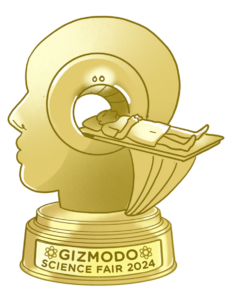Scientists at the West Virginia University Rockefeller Neuroscience Institute are winners of the 2024 Gizmodo Science Fair for their research on using ultrasound to improve the effectiveness and safety of Alzheimer’s disease medications.
Question
Is it possible to enhance the effectiveness of today’s anti-amyloid antibody drugs for Alzheimer’s disease, the most common form of dementia?
Results
In a first-in-human trial of three patients announced in January, the team found that its ultrasound technique combined with anti-amyloid antibodies appeared to speed up the removal of amyloid beta plaques from the brains of people with the disease. of Alzheimer’s. .
The reason they did it

The build-up of unstable and rigid amyloid beta in the brain is thought to be one of the main causes of Alzheimer’s, which affects about 7 million Americans today. Scientists have developed many lab-made antibodies that can destroy amyloid, but it is only recently that some of these drugs have shown enough success in clinical trials to receive regulatory approval. However, so far, these approved medications seem to have a moderate effect on improving people’s symptoms and slowing the rate of cognitive decline.
WVU scientists have been looking at the potential benefits of using focused ultrasound on the brain for years, with their Alzheimer’s research in humans starting in 2018. This research had already shown that a low-energy burst of ultrasound alone can release the blood-brain barrier. and can destroy amyloid plaque particles in the brain. But with the arrival of new drugs, the team wanted to see if combining two methods could be more effective than one to remove amyloid.
Why they won
The group’s focused ultrasound technique is designed to safely disrupt the blood-brain barrier, which protects the brain from infection and other injuries—but also prevents most drugs from easily reaching the brain. .
People undergoing an ultrasound procedure are monitored with an MRI while wearing a helmet that directs small bursts of ultrasound into certain blood vessels that pass through the brain. Doctors then inject very invisible air bubbles into these blood vessels. When ultrasound hits these bubbles, they temporarily expand and open the blood-brain barrier for a short period of time. During that short window, patients may receive more aggressive anti-amyloid therapy.
“If we can open the blood-brain barrier non-invasively and temporarily using ultrasound, that could provide the opportunity to deliver a targeted flow of drugs to areas of the brain that specifically need it,” said Ali Rezai, project leader and executive chairman of the Rockefeller Neuroscience Institute. And after this procedure, the blood-brain barrier will again function properly within 48 hours.
This approach would not only improve the effectiveness of anti-amyloid drugs but possibly make them safer, as people could be able to take them for a shorter period of time than currently prescribed (a few months if compared to two years, Rezai admits). Another concern with anti-amyloid drugs is their risk of causing life-threatening bleeding.
What follows
Rezai and his team plan to start a new, larger trial of the combination therapy this year, which will use a powerful anti-amyloid drug (the first study used the antibody aducanumab, which has since been discontinued) and target in a larger area. brain. They hope to show evidence that the treatment can speed up plaque removal as well as improve people’s mental health. They also hope to expand their efforts outside of WVU, working with scientists and patients in other research areas.
Although this research is still in its infancy, focused ultrasound procedures may go beyond Alzheimer’s. “Now that the brain-blood barrier can be safely overcome, that opens up many [treatment] possibilities, in my opinion—for brain tumors, for Alzheimer’s disease, Parkinson’s disease, and many other areas,” Rezai said.
The group
The January study involved a collaboration of more than a dozen scientists in different fields from West Virginia University and Vanderbilt University. And as the investigation grows, Rezai expects many more to get involved.
“I would say at least 100 people from different departments and different institutions are working together on this. We have colleagues in Europe. We have colleagues across the US. We have doctors from neurologists, neurologists, psychiatrists, psychologists, brain imaging specialists, PET scan specialists, MRI specialists, MRI, physicists, biomedical engineers, all work together in this research, ” Rezai said. “They are really multi-tasking professionals working together, as well as the public and private sectors. Collaboration is important because without it, it will be difficult to tackle these major public health problems like Alzheimer’s.
Click here to see all the winners of the 2024 Gizmodo Science Fair.
#Gizmodo #Science #Fair #Treating #Alzheimers #Disease #Ultrasound